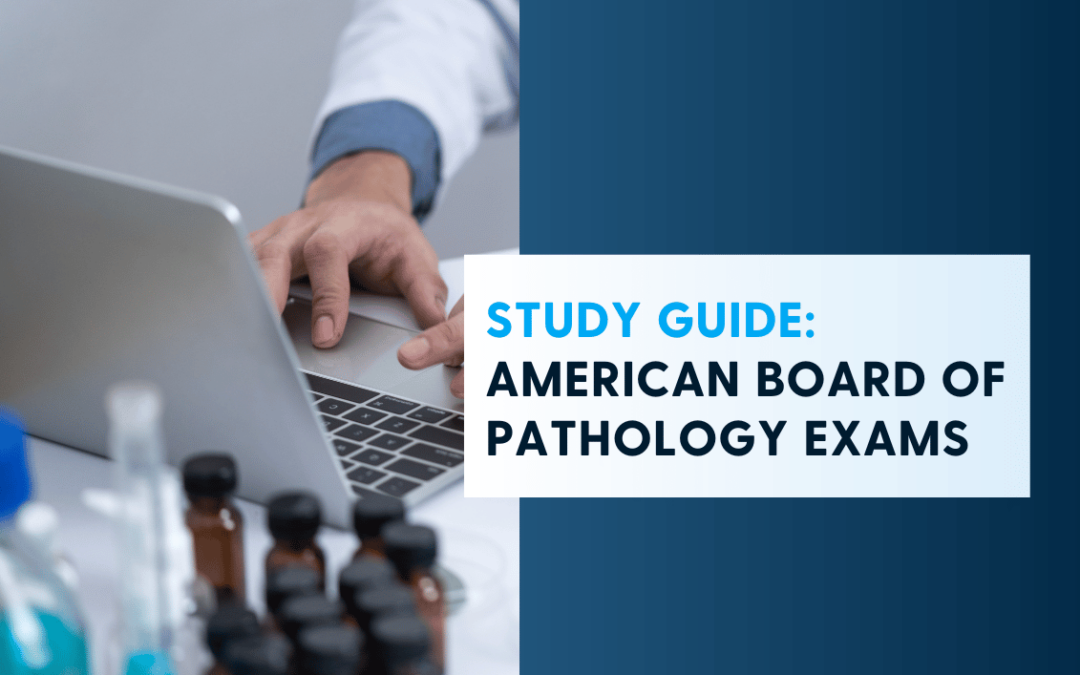By: Alli Hill, Recruiting Associate, Lab Director Services
One of the ways to become a CLIA-approved high-complexity lab director is to have a primary board certification by the American Board of Pathology (ABPath) in Anatomic or Clinical Pathology. This examination can be incredibly intimidating for first-time exam takers, and we want to help make this process as easy as possible for you. But how exactly does an individual obtain this certification? The first step is to make sure you are board-eligible before you can take the ABPath exam.
Requirements for certification by the ABPath are as follows:
(as stated by the American Board of Pathology website American Board of Pathology (abpath.org))
- Undergraduate Medical Education
- Medical school in the United States of Canada accredited by the Liaison Committee on Medical Education.
- Medical Licensure
- Must possess or have applied for a full and unrestricted license in a state or jurisdiction of the United States or Canada that will be valid by the time the examination results are released.
- Autopsy Requirements
- Must have completed a minimum of 30 autopsies by the time the application is submitted.
- Primary/Subspeciality Training Requirements
- For primary certification, you must have completed a graduate medical education program in pathology, obtain verification from the program director that you have demonstrated the six ACGME competencies (Patient Care, Medical Knowledge, Professionalism, Interpersonal, and Communication Skills, Practice-based Learning and Improvement, and Systems-based Practice), and complete a voluntary assessment to assure you have the judgment, knowledge, skills, and other abilities required by the ABPath for the practice of pathology.
- For subspecialty certification, you must obtain primary certification and 12 months of training in the subspecialty program of choice. Primary and Subspecialties are listed below:
Primary Certification
- Anatomic Pathology
- Clinical Pathology
- Combined Anatomic and Clinical Pathology
- Combined Anatomic and Neuropathology
Subspecialty Certifications
- Blood Banking/Transfusion Medicine
- Chemical Pathology
- Clinical Informatics
- Cytopathology
- Dermatopathology
- Forensic Pathology
- Hematopathology
- Medical Microbiology
- Molecular Genetic Pathology
- Neuropathology
- Pediatric Pathology
Once you determine that you are board-eligible and have applied for certification, you can now schedule your exam.
How to schedule my ABPath exam:
Next, you must create a PATHway account through the ABPath website to register for the exam. You’ll also be required to register for an account through Pearson VUE to schedule your exam during the scheduling period. As an applicant, you will receive an email during this period with further instructions on how to schedule this exam. This website will also include a list of current examination times and dates. Exams are given twice a year in the spring and fall sessions.
Pricing:
Upon scheduling an exam there is a $2100 fee due at submission. If you are taking the AP and CP test in the same session, the fee is $2600. If scheduled separately, the exams are $2100 each. All subspecialty exams also require a $2100 fee per exam. If canceled before the deadline, you will be refunded your examination fee minus a $500 fee. If canceled after the deadline, you forfeit your refund. If you are unable to take your examination due to personal illness or quarantine, you will be refunded your examination fee minus a $200 administrative fee. If you are unsuccessful in passing an exam, you are required to pay the $2100 fee for any retake exams.
How to prepare for the pathology board:
As you begin studying for each exam, there are some things to keep in mind. Each test has blueprints that give you a detailed breakdown of the exam content. These blueprints should be used as a guide to know what types of topics you can expect to see on each test. The link below provides the AP and CP Daily Examination Schedule, Description of the Examination, Examination Blueprint, and Examination Abbreviations and Terminology.
The American Board of Pathology also provides students with sample questions, practice exams, and an exam tutorial to help familiarize them with the functions of taking the exams.
Scores and Certifications:
After completion of the exam(s), you should receive an email in your PATHway stating whether you passed your exam about six weeks after the exam period. If you are successful in passing your exam(s), you will receive an engraved certificate within three to four months if all the proper documents are uploaded to your PATHway account.
If you are unsuccessful, you are eligible to retake the exam for five years. During this period, you can schedule and retake the ABPath exam as many times as you need. Unsuccessful candidates are the only ones who receive exam scores. Scores will not be given to those who successfully pass the exam(s).
Candidates who are unsuccessful in both AP/CP certifications are required to complete an additional year of ACGME-accredited training before reapplying for the exam. If a candidate is unsuccessful in one certification but successful in the other, they may apply for single certification. Candidates who are unsuccessful in their subspecialty exam must complete an additional six months of ACGME-accredited training.
Next steps
If you’ve successfully completed your exam and are now seeking new career opportunities, Lighthouse would be happy to assist you! We have an extensive network of clients in need of lab directors to fill full- and part-time positions, including remote opportunities. Reach out to us at any time to schedule a free consultation with our Lab Director Services Team!
